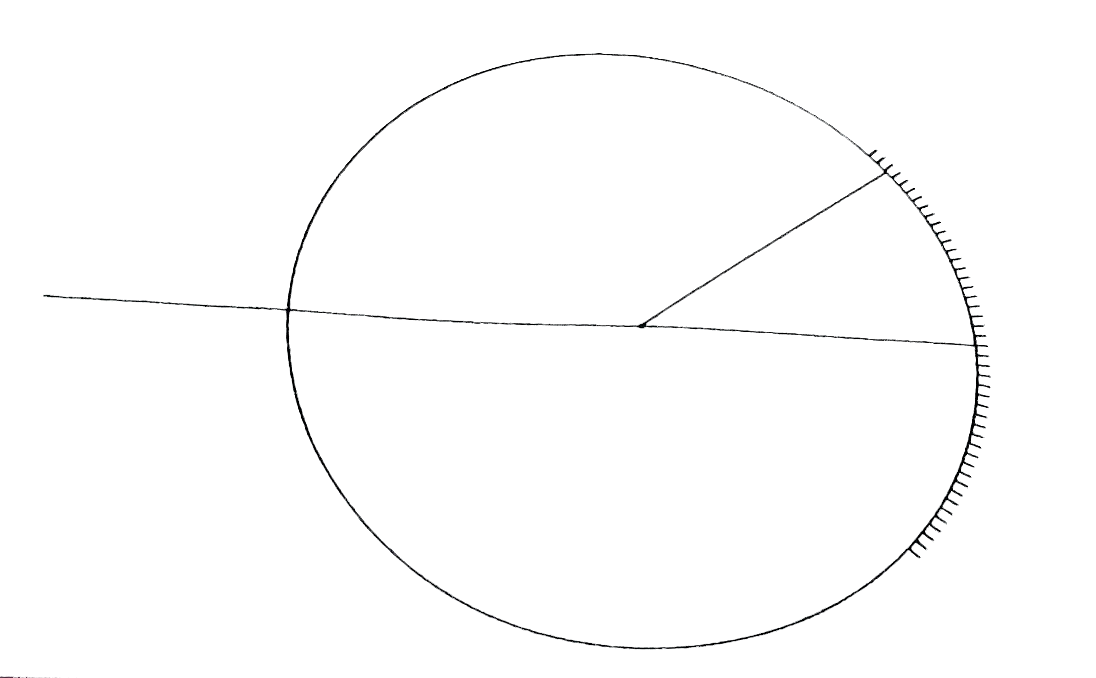Define the following terms in the context of spherical mirrors :
(i) Pole
(ii) Centre of curvature
(iii) Radius of curvature
(iv) Principal axis
(v) Principal focusSolution in Kannada
(i) Pole : The centre of the reflecting surface of a spherical mirror.
(ii) Centre of curvature : The reflecting surface of a spherical mirror is part of a sphere. The centre of that centre of that sphere is called centre of curvature.
(iii) Radius of curvature : The radius of the sphere from which a mirror is made.
(iv) Principal axis : An imaginary line passing through the pole and the centre of curvature. The principal axis is normal to the mirror at the pole.
(v) Principal focus : The point on the principal axis, at which incident light rays parallel to the principal axis converge or appear to diverge froms, is called the principal focus of the lens.
Topper's Solved these Questions
- LIGHT - REFLECTION AND REFRACTIONBOOK - ZEN PUBLICATIONCHAPTER - LIGHT - REFLECTION AND REFRACTIONEXERCISE - ZEN ADDITIONAL QUESTIONS SECTION (SHORT ANSWER [SA] TYPE - I QUESTIONS)
28 Videos
- LIGHT - REFLECTION AND REFRACTIONBOOK - ZEN PUBLICATIONCHAPTER - LIGHT - REFLECTION AND REFRACTIONEXERCISE - ZEN ADDITIONAL QUESTIONS SECTION (SHORT ANSWER [SA] TYPE - II QUESTIONS)
34 Videos
- LIGHT - REFLECTION AND REFRACTIONBOOK - ZEN PUBLICATIONCHAPTER - LIGHT - REFLECTION AND REFRACTIONEXERCISE - ZEN ADDITIONAL QUESTIONS SECTION (MULTIPLE - CHOICE QUESTIONS)
70 Videos
- ELECTRICITYBOOK - ZEN PUBLICATIONCHAPTER - ELECTRICITYEXERCISE - ZEN ADDITIONAL QUESTIONS SECTION (MULTIPLE CHOICE QUESTIONS)
60 Videos
- MAGNETIC EFFECTS OF ELECTRIC CURRENT BOOK - ZEN PUBLICATIONCHAPTER - MAGNETIC EFFECTS OF ELECTRIC CURRENT EXERCISE - Additional question section (Higher-order thinking skills [HOTS] questions)
20 Videos
Similar Questions
A pencil when dipped in water in a glass tumbler appears to be bent at the interface of air and water. Will the pencil appear to be bent to the same extent, if instead of water we use liquids like, kerosene or turpentine. Support your answer with reason.
View SolutionHow is the refractive index of a medium related to the speed of light ? Obtain an expression for refractive index of a medium with respect to another in terms of speed of light in these two media ?
View SolutionWhich of the following can make parallel beam of light when light from a point source is incident on it ?
View SolutionA cell, a resistor, a key and ammeter are arranged as shown in the circuit diagrams. The current recorded in the ammeter will be

View SolutionWhich of the following is true ?
View SolutionDefine the following terms in the context of spherical mirrors :
(i) Pole
(ii) Centre of curvature
(iii) Radius of curvature
(iv) Principal axis
(v) Principal focus
View Solutionकिसी गोलीय दर्पण के लिए निम्न को परिभाषित कीजिए (i) ध्रुव (ii) वक्रता केन्द्र (iii) मुख्य अक्ष, (iv) फोकस एवं फोकस दूरी।
View SolutionIndicate the following terms related to spherical mirrors in figure : pole, centre of curvature , radius of curvature , principal focus.

View SolutionDefine the following for a spherical mirror : (i) principal axis, (ii) radius of curvature, (iii) principal focus, (iv) center of curvature, (v) aperture, (vi) pole.
View SolutionDefine the terms of pole and centre of curvature of a spherical mirror.
View SolutionIndicate the following terms related to spherical mirrors in figure: Poles, centre of curvature, radius of curvature, principal focus.
View Solutionगोलीय दर्पण के ध्रुव,वक्रता केंद्र, त्रिज्या का मुख्य अक्ष को परिभाषित करें।
View SolutionDefine the following terms in the context of spherical mirrors :
(i) Pole
(ii) Centre of curvature
(iii) Radius of curvature
(iv) Principal axis
(v) Principal focus
View SolutionExplain the following terms related to spherical lenses : (i) Centers of curvature (ii) Principal axis (iii) Optic centre (iv) Radii of curvature (v) Principal focus (vi) Focal length and (vii) Linear aperture.
View SolutionDefine the following terms in the context of spherical mirrors :
Pole, centre of curvature, principal axis, and principal focus.
View Solution
